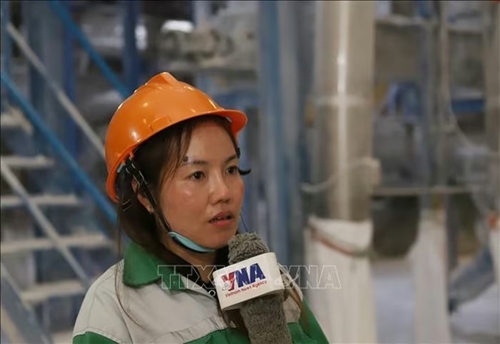In Sepon, a remote mountainous district of Savannakhet province in central Laos, the investment of Vietnamese businesses has contributed to boosting the local economy, thus improving the livelihoods of residents, creating jobs and promoting sustainable agricultural development across the region.
    |
 |
|
Thiphakesone Saysangoan, a worker at Sepon Tapioca Starch Processing Sole Co., Ltd. |
The stories of local workers and authorities stand as powerful testimony to a unique "two-in-one" investment model led by Vietnamese enterprises, which balances business development with deep social responsibility.
Thiphakesone Saysangoan, a worker at Sepon Tapioca Starch Processing Sole Co., Ltd. - a Vietnamese-invested company, shared that she made the switch to the firm four years ago and now enjoys a stable monthly income, health insurance, and proper sick leave policies.
What Thiphakesone values most is not just a steady income, but the company’s real commitment to the community. Alongside hiring locals, it supports cassava farming—Sepon’s key crop—by offering free seedlings, covering cultivation costs, and guaranteeing purchases. This has helped many households expand production without taking loans.
Nguyen Van Hiep, Director of Sepon Tapioca Starch Processing Sole Co., Ltd, said that since 2012, his company has pursued a dual mission - focusing on production and business operations, while actively contributing to local social welfare efforts.
He said the company offers free cassava seedlings, farming support, and technical training. Each year, it also provides rice for cassava growers, worth nearly 2 billion LAK (over 92,000 USD) in 2024, and contributes to public welfare funds, including support for local schools and infrastructure development.
The company’s long-term goal is to develop a stable raw material zone and expand its factory capacity to fully absorb cassava output from local farmers.
“We are operating in line with the guidance of the Vietnamese Party and State, while also meeting the demands of sustainable development in Laos,” Hiep stressed.
Sombat Itthavong, Vice Chairman of Sepon district, said Vietnamese businesses, especially in cassava processing and rubber cultivation, have helped improve living standards, boost incomes, and create real paths out of poverty.
Thanks to Vietnamese investment, the district has developed a cassava farming area spanning over 4,000 ha, generating stable income for local communities.
Thanongthai Soukkhamthat, Head of the Savannakhet Special Economic Zone Authority, said Vietnamese investment plays a key role in boosting socio-economic growth, especially in disadvantaged areas. He noted that Vietnamese firms bring advanced technology and create jobs, while Savannakhet’s tax breaks, free land leases, and labor incentives are helping attract more investors from Vietnam and those from other countries.
Source: VNA